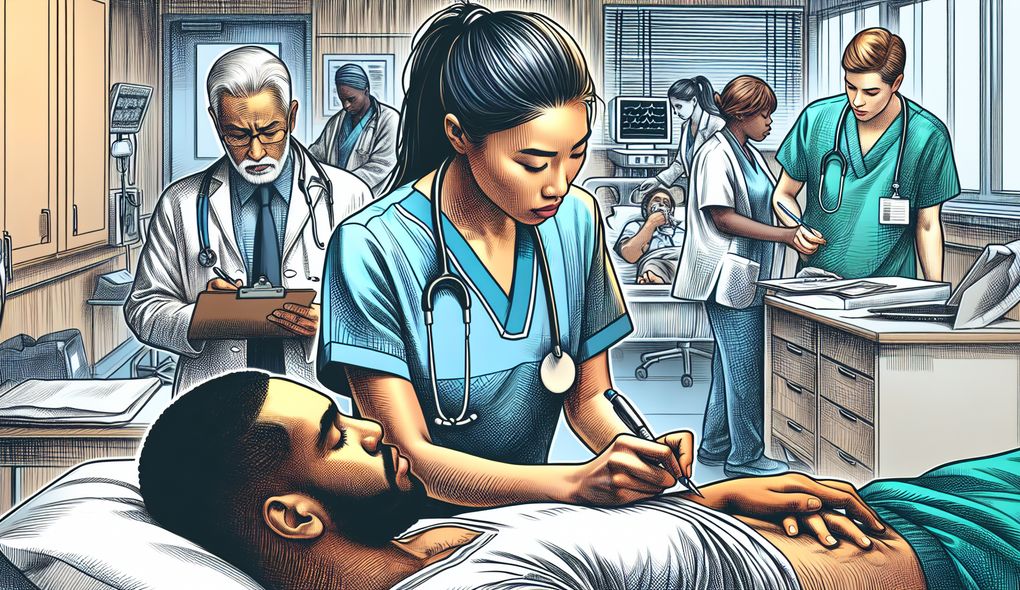What strategies do you use to effectively assess and diagnose patients in a fast-paced environment?
SENIOR LEVEL

Sample answer to the question:
In a fast-paced environment, I use a combination of systematic assessment techniques, effective communication, and critical thinking skills to assess and diagnose patients. I prioritize patient safety and take quick action to address urgent needs. I also rely on my experience and knowledge to recognize patterns and make accurate diagnoses. Additionally, I utilize medical software to access patient records and document my findings. Overall, I am able to adapt to the fast-paced nature of the emergency department and provide efficient and effective care to patients.
Here is a more solid answer:
In a fast-paced environment, I employ a systematic approach to assess and diagnose patients. I start by gathering a comprehensive medical history and performing a thorough physical examination. To ensure effective communication, I actively listen to the patient's concerns and involve them in the decision-making process. My critical thinking skills come into play as I analyze the gathered information, prioritize the patient's needs, and make timely decisions. With my strong clinical skills, I can quickly recognize acute conditions and initiate appropriate diagnostic tests. I am proficient in using medical software to access patient records and utilize evidence-based guidelines for diagnosis. My adaptability allows me to remain calm and focused during emergencies, ensuring efficient and accurate assessments. Overall, my strategies enable me to provide safe and timely care in a fast-paced environment.
Why is this a more solid answer?
The solid answer provides more specific details and examples to demonstrate the candidate's proficiency in the evaluation areas mentioned. It emphasizes a systematic approach, active communication, critical thinking skills, clinical proficiency, knowledge of medical software, and adaptability. However, it could still be improved by providing more specific examples or experiences related to assessing and diagnosing patients in a fast-paced environment.
An example of a exceptional answer:
In a fast-paced environment, I employ a systematic approach to assess and diagnose patients effectively. I start by quickly triaging patients based on their acuity level and addressing any immediate life-threatening conditions. I then gather a focused medical history and perform a targeted physical examination to identify relevant findings. Utilizing my excellent communication skills, I ensure clear and concise interactions with patients, their families, and the healthcare team, building trust and facilitating accurate information exchange. My strong clinical skills enable me to recognize subtle changes in patients' conditions and make timely interventions. I prioritize patients based on the severity of their conditions and take swift action to initiate diagnostic tests and interpret the results promptly. With my extensive experience using medical software and electronic health record systems, I efficiently access and document patient information, maintaining accurate and comprehensive records. My critical thinking skills come into play when analyzing complex cases, collaborating with the healthcare team to develop appropriate treatment plans. I have demonstrated adaptability in high-stress situations, making quick and well-informed decisions to provide optimal care to patients. By staying current with the latest evidence-based guidelines and participating in continuous education, I ensure my knowledge and skills are up-to-date. These strategies, combined with my ability to remain calm and composed, allow me to effectively assess and diagnose patients in a fast-paced environment.
Why is this an exceptional answer?
The exceptional answer provides specific details and extensive examples to demonstrate the candidate's exceptional proficiency in the evaluation areas mentioned. It incorporates elements such as quick triaging, focused history taking and physical examination, clear communication, clinical proficiency, prioritization, efficient use of medical software, critical thinking skills, adaptability, staying updated with guidelines, and remaining composed in high-stress situations. This answer highlights the candidate's expertise in effectively assessing and diagnosing patients in a fast-paced environment.
How to prepare for this question:
- Familiarize yourself with various assessment techniques and diagnostic tools commonly used in emergency medicine.
- Practice active listening and effective communication skills to build rapport with patients, families, and healthcare professionals.
- Develop strategies to prioritize patient needs based on acuity and severity of conditions.
- Stay updated with the latest evidence-based guidelines and advancements in emergency medicine.
- Enhance your proficiency in using medical software and electronic health record systems.
- Seek opportunities to work in fast-paced environments, such as volunteering in emergency departments or taking on challenging clinical rotations.
- Reflect on past experiences where you successfully assessed and diagnosed patients in a fast-paced environment and be prepared to share those stories during the interview.
What are interviewers evaluating with this question?
- Clinical skills
- Communication skills
- Critical thinking skills
- Prioritization
- Knowledge of medical software
- Adaptability

